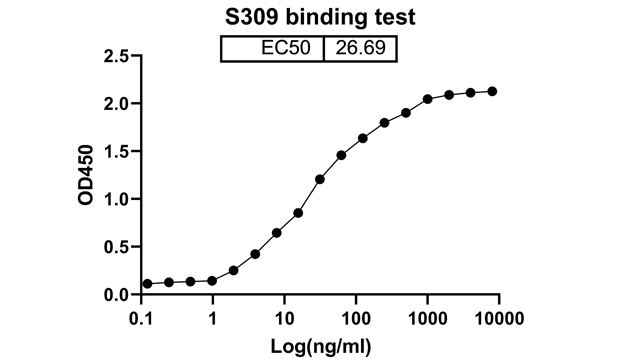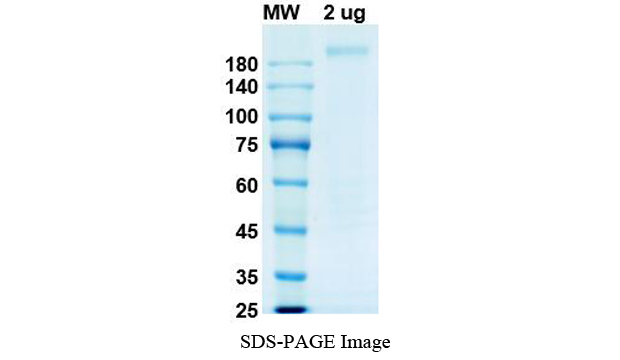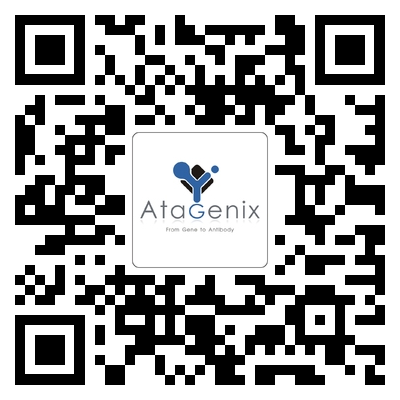普健生物(武汉)科技有限公司(AtaGenix)
Recombinant 2019-nCoV S -trimer Protein


- 1
- 2
- 产品信息(Product Details)
- 如何订购
- 说明书
产品概述(Summary)icon
产品名称(Product name)
Recombinant2019-nCoV S -trimer Protein
货号(Catalog#)
ATMP02492COV
描述(description)
Recombinant SARS-CoV-2 S protein is produced by Mammalian cells expression system and the target gene encoding Met1-Gln1208 is expressed with C-His Tag
表达系统(Expression system)
Mammalian cells
种属(Species)
Severe acute respiratory syndrome coronavirus 2 (SARS-CoV-2)
Accession #
P0DTC2
别名(Alternative names)
Spike glycoprotein, S glycoprotein, E2, Peplomer protein
预测分子量(Predicted Molecular Mass)
138.09kDa
纯度(Purity)
>90% as determined by SDS-PAGE
内毒素(Endotoxin level)
Please contact with the lab for this information
制剂(Formulation)
Lyophilized.Lyophilized from a solution in PBS pH 7.4,1mM EDTA, 4% Trehalose, 1% Mannitol.
运输方式(Shipping)
In general, proteins are shipped out with blue ice unless customers require otherwise.
稳定性&储存(Stability &Storage)
Use a manual defrost freezer and avoid repeated freeze thaw cycles.
Store at 2 to 8 °C for one week .
Store at -20 to -80 °C for twelve months from the date of receipt.
Store at 2 to 8 °C for one week .
Store at -20 to -80 °C for twelve months from the date of receipt.
复溶(Reconstitution)
Reconstitute in sterile water for a stock solution.
应用(Application)
Immunogen
电泳图(SDS-PAGE image)icon
活性(Bioactivity)icon
背景(Background)icon
Protein S (PROS1) is glycoprotein and expressed in many cell types supporting its reported involvement in multiple biological processes that include coagulation, apoptosis, cancer development and progression, and the innate immune response. Known receptors bind S1 are ACE2, angiotensin-converting enzyme 2, DPP4, CEACAM etc.. The spike (S) glycoprotein of coronaviruses is known to be essential in the binding of the virus to the host cell at the advent of the infection process. Most notable is severe acute respiratory syndrome (SARS). The severe acute respiratory syndrome-coronavirus (SARS-CoV) spike (S) glycoprotein alone can mediate the membrane fusion required for virus entry and cell fusion. It is also a major immunogen and a target for entry inhibitors. It's been reported that 2019-nCoV can infect the human respiratory epithelial cells through interaction with the human ACE2 receptor. The spike protein is a large type I transmembrane protein containing two subunits, S1 and S2. S1 mainly contains a receptor binding domain (RBD), which is responsible for recognizing the cell surface receptor. S2 contains basic elements needed for the membrane fusion.The S protein plays key parts in the induction of neutralizing-antibody and T-cell responses, as well as protective immunity.
Noteicon
For research use only .
1搜索商品:关键字搜索;分类导航搜索;产品联系:手机/微信同号:15972188750,座机:027-65279366(推荐 !)
2产品选购:确定好产品信息与规格,向产品客服询问底价
3提交订单:向客服提交收货人信息,选择送货方式,支付方式,发票信息
4产品发货:发票随产品一起发送,耐心等待收货即可
质量保证:
所售产品均经过严格的质量检验,确保所供产品的技术指标与生产厂家的目录、说明书、质检报告上的描述一致,请放心选购。
质量与免责说明:
买方验收产品时,如发现产品短缺、不匹配、包装破损等情况,请保持产品原包装状态,并在收货七个工作日内,以书面方式向我司提出异议。逾期未提出异议视为合格。
买方保管产品时,应按照产品标签、说明书所示保管条件保存,如系保管不当导致产品质量问题,恕不受理。
买方使用产品时。如发现产品质量问题,应在使用初期提出,而非在使用完或快使用完时提出,以备我司回收产品,确认产品质量。如确属质量问题,我司负责调换或退货。发生索赔事宜,我司将在产品价格额度范围内酌情赔偿,恕不受理超出产品本身价值之部分。自收货之日起,超过三个月未反映产品问题,恕不退换。
我司所提供的产品仅限于专业人士的科学研究使用,不得用于临床诊断或者治疗,若有单位或者个人擅自改变我司产品用途,我司不承担任何责任。
普健生物(武汉)科技有限公司(AtaGenix) 鄂ICP备15005566号-1
Copyright © 2024 Lawyer Theme All Rights Reserved
Copyright © 2024 Lawyer Theme All Rights Reserved




